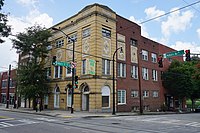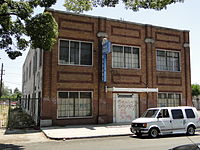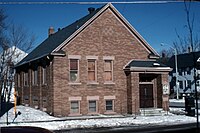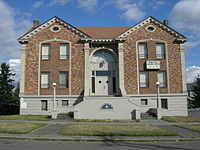
Prince Hall Freemasonry
Prince Hall Freemasonry is a branch of North American Freemasonry created for African Americans founded by Prince Hall on September 29, 1784. There are different organizations which purport to be of Prince Hall Freemasonry: the independent, ‘Prince Hall Affiliated’ or ‘PHA’ Grand Lodges, most of which are recognized by their State Grand Lodge counterparts and the United Grand Lodge of England, being considered ‘regular’ in freemasonry; and those under the jurisdiction of a ‘National Grand Lodge’, ‘Prince Hall Origin’, or otherwise non-Prince Hall Affiliated lodge or Grand Lodge, considering them ‘irregular’,‘clandestine’ and unrecognized by both the Prince Hall Affiliated masonic bodies, and their ‘mainstream’ masonic counterparts. Prince Hall Freemasonry is the oldest and largest (300,000+ initiated members) predominantly African-American fraternity in the United States.[1]
Legacy[edit]
Prince Hall's legacy as a Freemason and a leader has survived with the lodges; Hall is considered the "father of African-American Freemasonry". As a Georgia Mason noted, the original local lodge rules written by Prince Hall and his followers in the late 18th century were the first set of regulations drafted by colored men for self-government in the United States, and Masonry ever since has striven to teach its members 'the fundamentals of central government' which is the basis of American life."[4]: 74 [14]
After nearly two centuries of controversy, the Grand Lodge of England was asked by a US "mainstream" Grand Lodge to decide the matter of Prince Hall Masonic legitimacy.
While no Grand Lodge of any kind is universally recognized, at present, Prince Hall Masonry is recognized by some UGLE-recognized Grand Lodges and not by others, but it is working its way toward further recognition.[24]
When two Grand Lodges recognize and are in Masonic communication with each other, they are said to be in amity, and the brethren of each may visit each other's lodges and interact Masonically. When two Grand Lodges are not in amity, inter-visitation is not allowed.[25] Exclusive Jurisdiction can be waived when the two over-lapping Grand Lodges are themselves in Amity and agree to share jurisdiction (for example, since the Grand Lodge of Connecticut is in Amity with the Prince Hall Grand Lodge of Connecticut, the principle of Exclusive Jurisdiction does not apply, and other Grand Lodges may recognize both).[26]
After carefully studying the records, the Grand Lodge of England concluded that the original Prince Hall Grand Lodge of Massachusetts was indeed entitled to Masonic recognition, despite the general tradition of "exclusive jurisdiction", which meant that only one recognized Masonic body could exist in each state.
According to data compiled in 2021, 46 out of the 51 mainstream U.S. Grand Lodges recognize Prince Hall Grand Lodges. The few mainstream state Grand Lodges that currently do not recognize Prince Hall Grand Lodges are located in southern states, an area with an estimated 50% of Prince Hall Freemasons:[27] Mississippi, Louisiana, Arkansas, South Carolina and West Virginia.[28][29] While African-Americans can join any lodge in North America, Prince Hall Masonry remains a vital part of American tradition.[30]
The organisation is named after:
There have been many other notable Masons who were affiliated with Prince Hall originated Grand Lodges, including:




